When it comes to your cat’s overall health, there are homeopathic remedies you can use that may be just as effective as their chemical-treatment equivalents. Because skin is one of the largest organs of a mammals’ body, taking proper care of your cat includes addressing and treating any skin conditions, even if they appear minor.
Therefore, it’s important to conduct routine inspections of your cat’s coat and skin, including his fur, claws, padding on his feet, and skin inside the ears. If you detect anything abnormal, it’s always best to consult with your veterinarian to address the possibility of underlying health issues.
Depending on the severity of pre-existing skin diseases or ailments, a natural course of treatment may be the best solution for you and your pet. In this article, we’ll identify common cat skin conditions and explore helpful suggestions for at-home remedies that may provide your furry friend with natural relief.

Identifying Skin Conditions in Cats
Before administering any type of treatment, the first step in creating a maintenance routine for your kitty’s skin and coat is to inspect him thoroughly. It may be a bit more difficult to recognize skin problems in cats since their hair covers the majority of their bodies.
Therefore, inspecting them carefully is essential to maintaining optimal pet health. The best way to check for abnormalities is to brush your cat while carefully moving your hand against the grain, so that you may examine the skin for any signs of dermatitis or irritation.
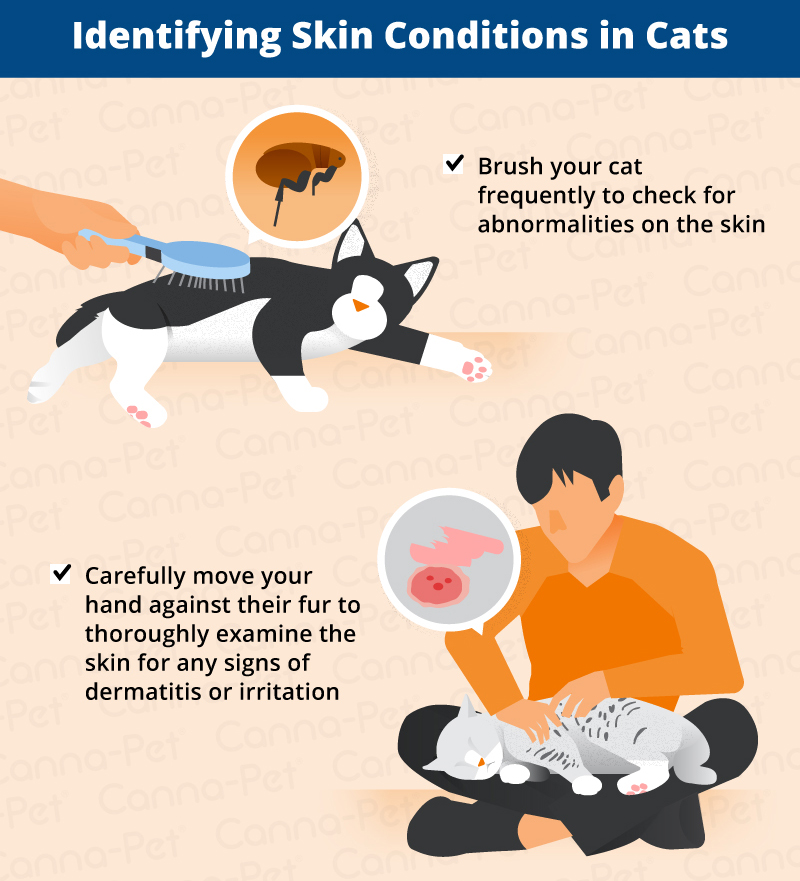
Some cat skin problems to look for include:
- Abscesses
- Bleeding
- Bruises
- Cuts or lacerations
- Dryness
- Flaking
- Fleas and ticks
- Hair loss
- Insect bites
- Lesions or abrasions
- Lumps
- Mites
- Parasites
- Pimples or cysts
- Redness or inflammation
- Swelling
If you notice any of these conditions (particularly if the symptoms are severe or persistent), it’s best to consult with your veterinarian before beginning any course of treatment.
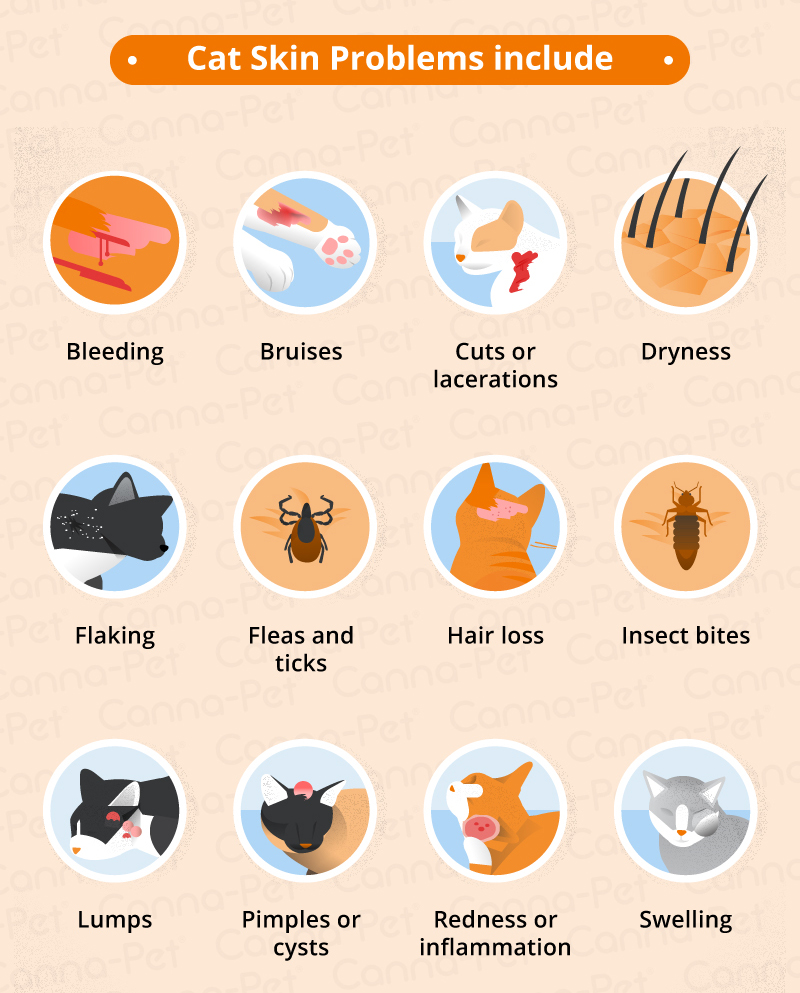
Fleas: Establishing A Routine for Prevention
Although fleas are common and can be routinely managed at home with over-the-counter treatments, your vet can provide you with a comprehensive course of preventative measures and appropriate medications. In certain cases, your cat may actually be allergic to flea bites, which is due to a reaction from the insect’s saliva.
Some symptoms associated with flea allergies include:
- Biting or pulling at the hair/fur and skin
- Small skin lesions that are red and inflamed
- Hair loss (alopecia)
- ‘Hot spots’ (technically referred to as acute moist dermatitis)
Depending on your geographical location, your cat’s allergic condition may be seasonal, as fleas are typically prevalent in the warmer months. You can help reduce existing fleas by combing your cat with a flea comb, along with keeping him indoors as much as possible.
Ultimately, the best line of defense includes a topical flea product that both kills and repels fleas; however, you may wish to ask your vet for suggestions. This is especially noteworthy if your cat suffers from feline allergies, pre-existing feline skin conditions or a known flea allergy, as some store-bought medications and treatments can actually make your pet’s symptoms worse.
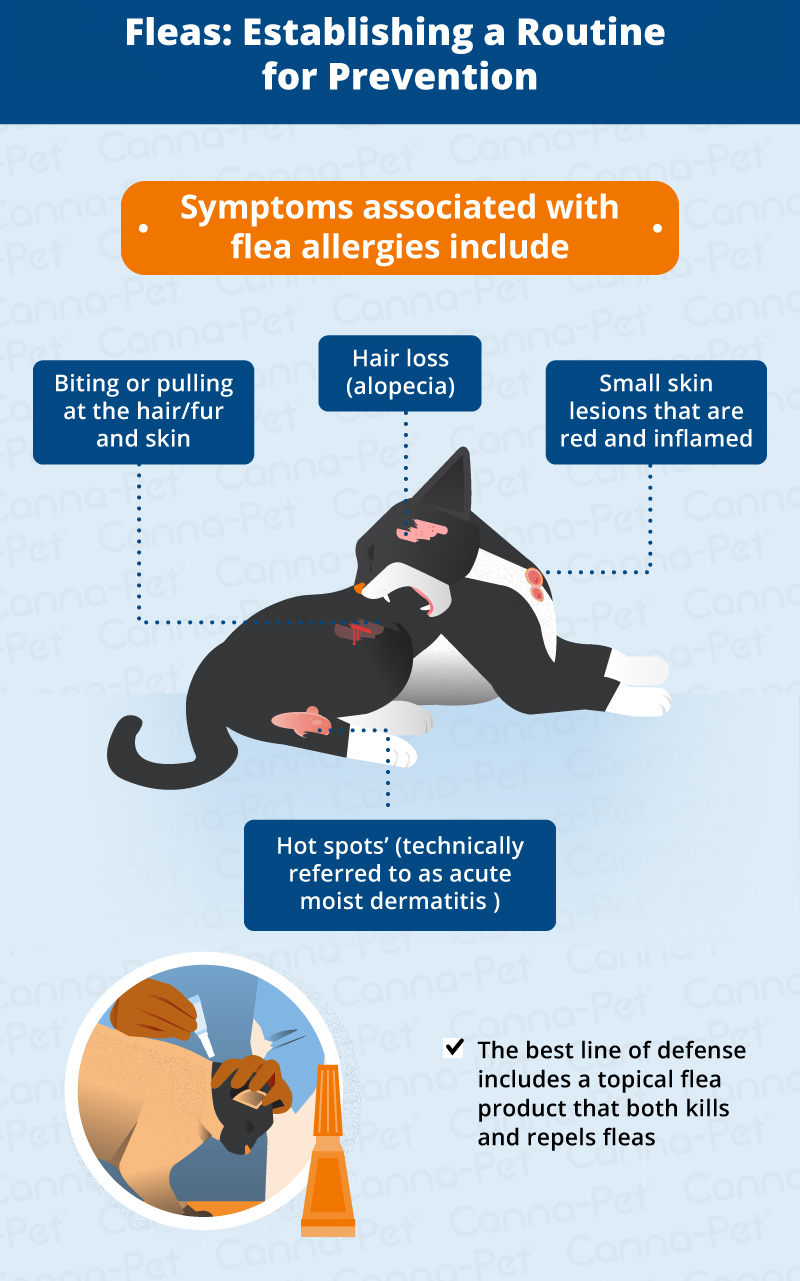
Cat Skin Allergies: Knowing The Signs & Symptoms
One of the most common causes of feline skin problems is allergies. However, the challenge is determining the allergens affecting your cat. Typically, your vet will run a series of tests to determine the source of your cat’s skin condition. Once your vet has ruled out other possible cat skin diseases, the next step is identifying what type of allergy your cat suffers from.
There are a number of common cat allergies (in addition to flea allergies) pet owners should be aware of, including:
Food allergies: Just like their owners, cats can experience food allergies, too. Some of the symptoms include:
- Frequent ear infections
- Interdigital dermatitis (inflammation between the toes)
- Itching, wheezing, sneezing, and coughing
- Pimples and rashes
- Pulling out hair/hair loss (alopecia)
- Recurrent diarrhea or vomiting
- Red or inflamed patches of skin
- Rubbing or persistent scratching
Some of the foods associated with allergic reactions include wheat and yeast, soy, dairy products, beef, fish and poultry, among others. While it is tricky to figure out the exact foods your cat is allergic to, your veterinarian will screen your cat through a series of lab work to ascertain the results.
Once you know which types of foods to avoid, an elimination diet (introducing one type of food at a time and monitoring your kitty’s reaction) may be a course of action worth exploring. In this case, pet owners must become diligent label-readers and check for ingredients that may cause a reaction. One of the easiest ways to avoid mistakes is to bring a list of your pet’s known allergens to the pet store where you purchase your cat’s food; if you are unsure as to the most appropriate brand, a staff member can usually be of assistance.
You can also go on the pet food brand’s website to conduct further ingredient research, or ask your vet for safe pet food recommendations. Although buying organic food is typically healthier for your cat, it’s still important to read the labels: just because it’s touted as ‘all-natural’ doesn’t ensure that it is free of food allergens.
As you discover what works (and what doesn’t) during mealtime, be sure to monitor your cat’s reactions and general health – over time, symptoms should be minimized if you follow a careful diet. You may also wish to ask your vet if a dietary supplement can further boost their immune system.
Contact dermatitis & other cat skin conditions: A less common skin ailment, contact dermatitis is defined as a condition where your cat is allergic to environmental substances they come in contact with.
Tell-tale symptoms include:
- Inflammation around the mouth/muzzle
- Irritation under the chin that may include pimples or lesions
Some of the substances cats have been known to have allergic reactions to include petroleum-based materials (such as plastic), rubber, nylon, detergents and other chemicals, and even plant-based allergens such as poison ivy.
Many cats will display an allergic reaction to common household items, such as their water dish or a favorite toy containing the offending substance. If you notice sudden allergic reactions and are able to identify the source, you can make simple changes, such as switching out your kitty’s plastic water dish with a stainless steel bowl. If you are still uncertain as to the cause of your feline companion’s allergic reactions, it’s best to consult with your veterinarian.
Other cats may suffer from allergic dermatitis, which is a broad terminology used to describe chronic allergies. If you have an outdoor cat, it’s especially important to inspect his coat on a regular basis to check for any skin irregularities, particularly if he’s prone to skin allergies.
One of the easiest ways to ensure he’s free of pollen, mold spores or other environmental debris is to wipe your cat down with a clean, damp towel every time he returns to the house.
Other factors that may be the culprit for your cat’s skin condition include lice, ticks, parasites, mites, mange, fungal infections, and even anxiety disorders (including OCD).
Some other underlying health conditions linked to dry skin include but are not limited to:
- Diabetes
- Hyperthyroidism
- Malassezia
- Ringworm
- Seborrhea
Cats are also susceptible to yeast infections, especially in the ears. Feline yeast infections are usually linked to an underlying skin disorder. If you notice any symptoms, including excessive itching, flaking of the skin, foul odor, head shaking or discharge, a trip to your vet is the safest option.
Natural Products & Home Remedies for Cat Skin Conditions
When it comes to making our feline friends comfortable, pet owners will go to any length to provide them with relief, especially if they’re in pain. Because skin ailments and allergies are often lifelong chronic conditions, it’s helpful to consider the benefit of all-natural treatments you can do at home. In addition to soothing your cat’s irritated skin, certain home remedies offer a healthier alternative to chemical-laden treatments.
There are a number of oral supplements and liquids available to promote your cat’s overall health and well-being, particularly if he’s on an organic or special diet. You may also shop online or at your local pet store for all-natural products, including hypoallergenic foods, organic bedding, paraben-free toys and other allergen-free essentials for your cat. As in all cases, be sure to check with your veterinarian before administering any type of medication, remedy or treatment to your pet.
Here are a few all-natural products and home remedies for soothing irritated skin:
For treating wounds and swelling: When your cat is recovering from a wound or swelling due to an injury, Epsom salts are a great natural (and inexpensive) way to provide quality care at home. If your cat is cooperative, Epsom salt soaks are helpful during the healing process. As always, check with your vet first.
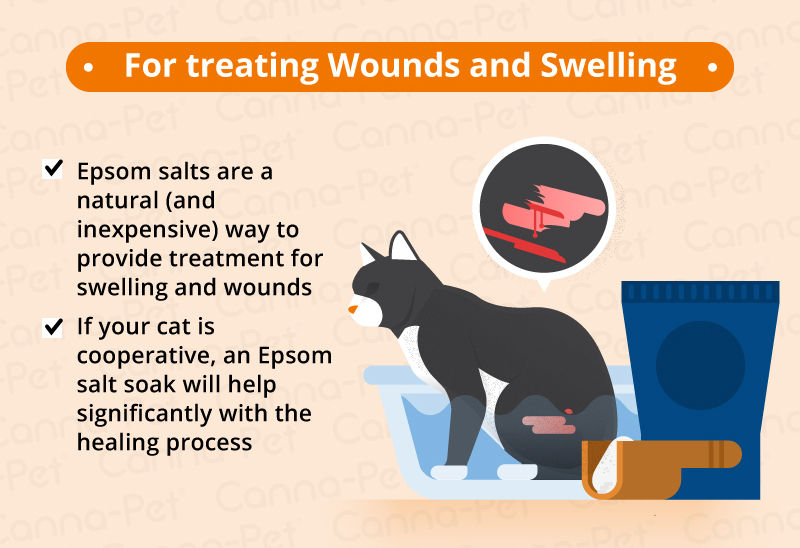
For soothing raw, irritated skin: An excellent all-natural home remedy, chamomile tea has been used for thousands of years for its medicinal and antiseptic properties. By killing off yeast and bacteria that can cause (or worsen) lesions and skin abrasions, this plant-based tea calms minor skin irritations. Create a soothing solution for your cat by brewing a strong pot of tea and chilling it in the refrigerator. Once it is completely chilled, pour it into a spray bottle and spray on the affected areas for cooling relief.
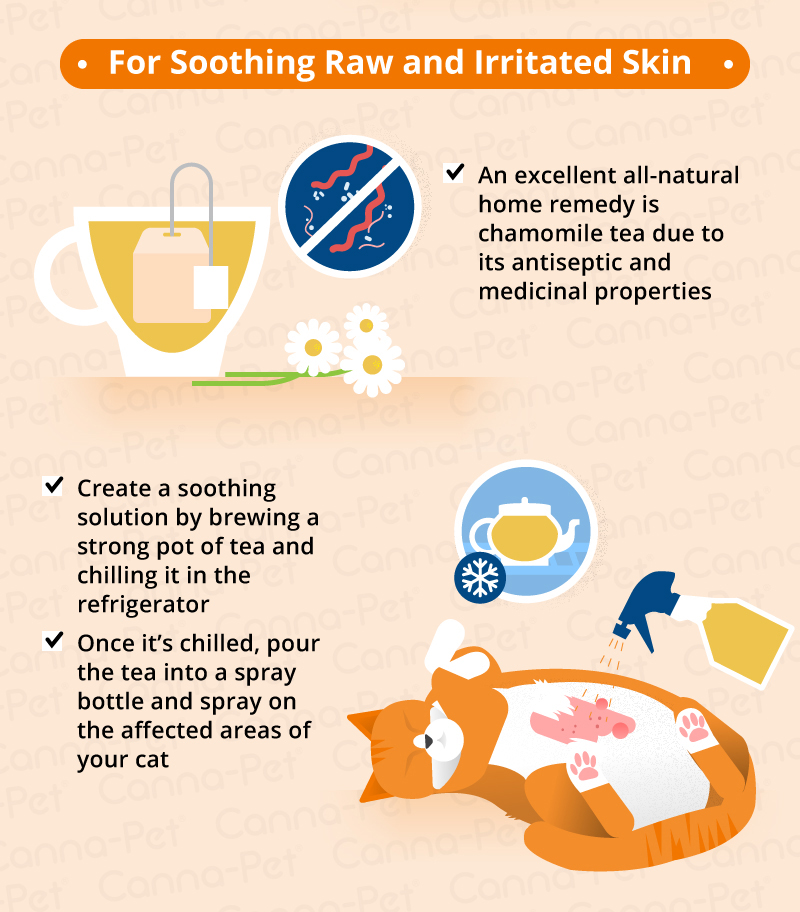
For treating the itchies: Although most cats are not known for loving bath-time, plain oatmeal is a wonderful and gentle treatment for felines suffering from extremely itchy skin. Stir super-fine baby oatmeal cereal into a bath of lukewarm water – this treatment is especially beneficial for pets with allergies, itch-inducing skin diseases or other infections (added bonus: because it’s all-natural, it’s safe if they happen to drink the water).
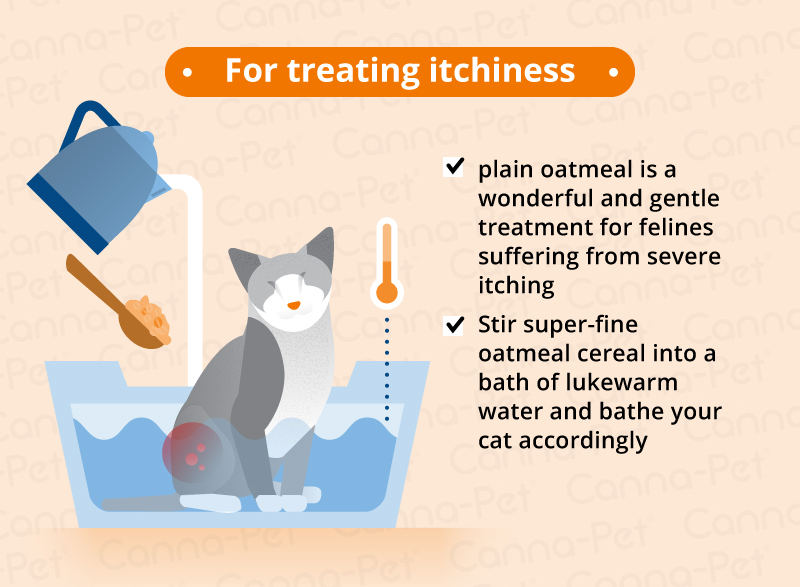
For dandruff-prone cats: One of the simplest of home remedies, wrapping your cat in a hot towel can provide instant relief to cats who suffer from dry, flaky skin. First, soak a clean towel or rag in hot water (but not too hot that you can’t comfortably hold in your hands). Next, wring it out thoroughly and carefully drape over the affected areas while holding your cat. Keep him wrapped for up to five minutes while calmly petting him and showing him affection.
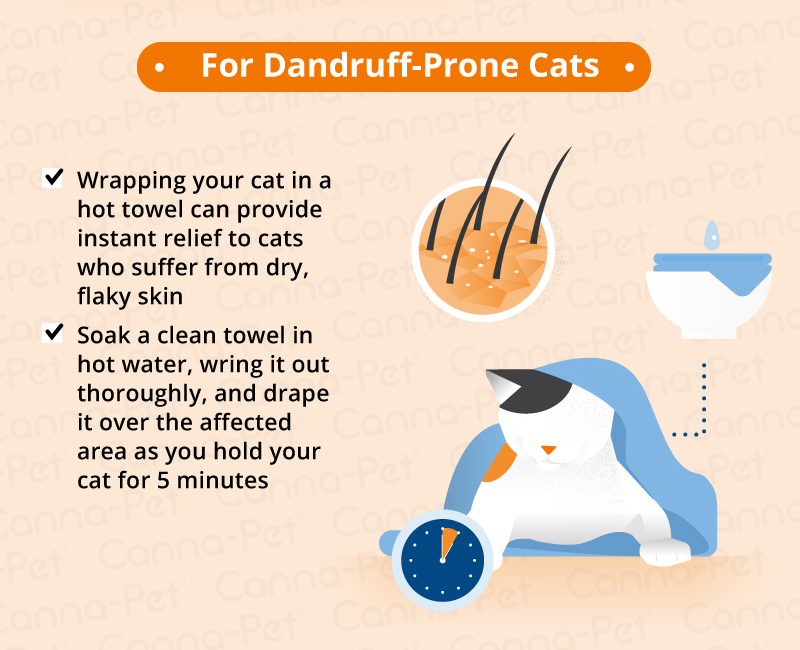
Preventative Measures: The Best Medicine
Although it may seem like an obvious precaution, sometimes the best medicine for skin irritations is a dose of prevention. Unlike dogs, cats are relatively clean animals – they’re self-grooming and don’t require the frequent bathing of their canine counterparts. Keeping that in mind, don’t over-bathe your cat, as the naturally-occurring oils in their skin and hair provide a layer of protection.
Bathing can dry out your cat’s coat, thus resulting in itchy or irritated skin. Make it a routine to brush your cat to keep him clean, soft and free of debris and allergens. Regular brushing also exfoliates dead skin and removes shedding hair, which can lead to irritation.
In addition to a well-balanced diet, adequate water, and regular check-ups, the best way to maintain the health of your cat’s skin and coat includes Omega-3 fatty acids, which may be found in enriched cat food and treats, as well as specially-formulated dietary supplements.
You may also wish to invest in a humidifier for your home or apartment, particularly in the drier months when there is less moisture in the atmosphere. Finally, keep your beloved feline out of hot, dry weather – even if it means discouraging him from lying in a sunny window for long naps. Just as we get sunburns, high temps and dry conditions can damage your cat’s delicate skin, too. Taking these simple precautions can help protect your favorite feline from skin problems while keeping him comfortable and happy throughout his lifetime.
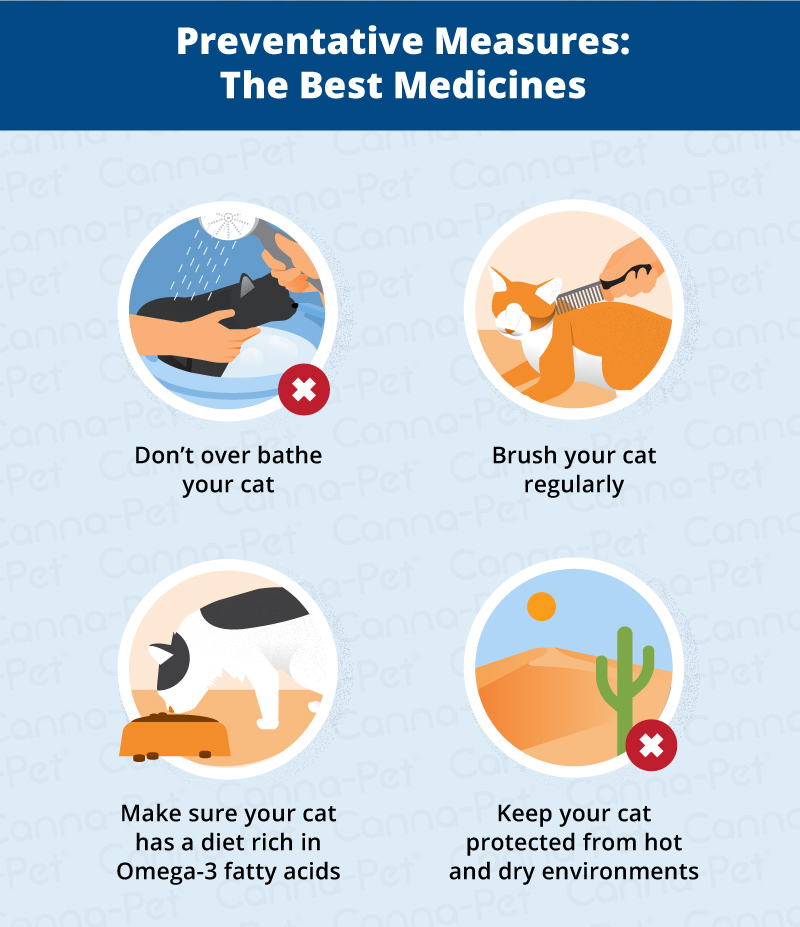
Full Infographic

Sources:
- “10 Cat Skin Problems and How to Handle Them.” Catster, 1 June 2018, Accessed 7 Dec. 2016. www.catster.com/cat-health-care/cat-skin-problems.
- “Cat Skin-Problem Pictures: Lice, Fleas, Ringworms, Ear Mites, and More.” WebMD, Accessed 7 Dec. 2016. www.pets.webmd.com/cats/ss/slideshow-skin-problems-in-cats.
- “7 Common Skin Problems in Cats.” PetMD, Accessed 7 Dec. 2016. www.petmd.com/cat/slideshows/7-common-skin-problems-cats.
- “Cat Skin Problems Pictures Care and Treatment.” Cat Health Guide, Accessed 7 Dec. 2016. www.cat-health-guide.org/cat-skin-problems.html.
- Barrington, Katherine. “Natural Remedies for Skin Problems in Cats.” The Nest, 14 July 2016, www.pets.thenest.com/natural-remedies-skin-problems-cats-3567.html.





